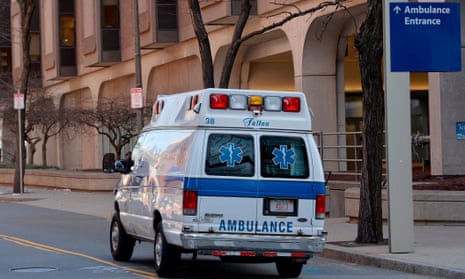
I’m in awful pain, on a morphine drip – and still I’m thinking about the cost. This is US healthcare after all

The call centre for my insurer is in Scotland but the system is all-American. When the bills arrive, the hurt begins all over again
I have lived for long enough in the US to be acclimated to most of the cultural differences, starting with 20% tipping and ending with the customary address of strangers as “sir”, or “ma’am”, as opposed to the dithery British “er, excuse me?”. The exception to this, of course, is US healthcare, which will never strike me as less than outlandish. So it was, last week, when I had cause to call 911 in the middle of the night, but only after putting in a call to my insurers to request pre-authorisation.
If you take the narrowest view, there are aspects of US healthcare that are superior to the UK and European models. In the early hours of last Thursday morning, I knew, for example, that an ambulance would arrive at my door within 10 minutes and probably sooner, no questions asked. I knew that, once I’d been discharged from the ER, I would be able to choose my own doctor for follow-up care, and have some say in how, where and when I was treated. I also knew, with a certainty that I suspect deepened the back spasms that kicked off the whole thing in the first place, that if I didn’t take the necessary steps, I would be receiving a $3,000 invoice from my insurers for the cost of the ride – and that even if I did everything right, there was no guarantee.
For reasons that have never been clear to me, the call centre for my insurer – a policy bought through a broker in Dubai, regulated in the Channel Islands, and falling under the umbrella of one of the biggest insurers in the US – is located in Scotland, ensuring that the man who picked up my call had to strain as hard as I did to pretend this situation was normal. I gave him a quick run-down: agonising pain; inability to move; shortness of breath as the spasms got deeper; above all, keenness to avoid bankruptcy by reminding him that I had no control over which hospital the ambulance came from – that is, whether or not it fell within my insurance network.
“Right,” he said. “Right.” I asked if he could pre-authorise coverage and he said that he could certainly try, but of course “that doesn’t mean …” He trailed off. “But it can’t hurt, can it!” he said brightly, at which point I began heavy breathing with pain, bumping us from one script (policyholder seeks pre-authorisation) to another (woman on edge, requires careful handling). “I’m just going to talk nonsense to you, if that’s OK?” he said gently and began telling me about the weather in Scotland. This was lovely, in its way, but after a few moments didn’t seem to be fixing things and I hung up to call 911.
Pro tip: if you’re ever in New York and in agony, the line “I just need some fentanyl to get me moving again!” will not have the intended effect. Ten minutes later, two EMTs at my bedside informed me severely that paramedics in the city don’t carry pain drugs, for obvious reasons of safety. This is a very bad moment for me vis-a-vis my faith in the consumer choice of American healthcare. “Look,” I said desperately, indicating a bottle by my bedside, “I have two oxycodone left from when this happened four years ago – that’s how much not of an addict I am!” “I doubt it even works this far out,” said the paramedic – no shit – and conveyed me via stretcher to the ambulance, yelping.
I could make a point here about the limits of choice within healthcare, or the desperate anxiety entailed in the cost of US emergency care. Truthfully, though, the sweet relief of not being in pain has yet fully to wear off. At the ER, the doctor, when she finally saw me, offered a pathetic Lidocaine pain relief patch, which might as well have been a plank of wood to bite down on. “Um,” I said, sweating and shaking and trying with every fibre of my being to convey not-addicted-to-opioids vibes. A man down the corridor shouted, “I’m in pain! I’m in pain” – shut up you idiot, you’re going to ruin it for all of us – and the doctor sighed. As if giving in, she ordered the nurse to put me on a morphine drip until morning, which was heaven, obviously, but for which the price will be dear. Now I’m home, feeling better, and braced for the cost: invoice, appeal, escalation, eventual arbitration, and the huge expenditure of time and money that is a guaranteed part of falling ill in the US. The real pain begins.
-
Emma Brockes is a Guardian columnist


